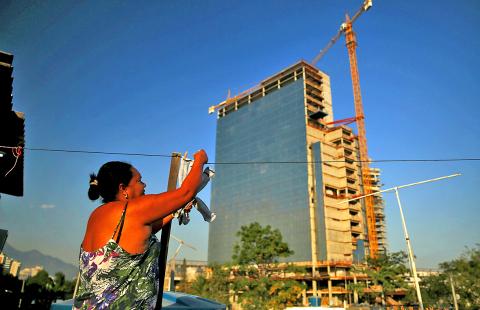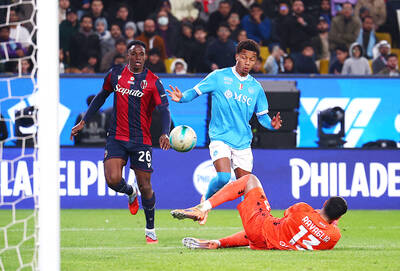The Olympic Park for next year’s Olympic Games is going up in one of Rio’s wealthiest areas, and real estate prices are soaring even as Brazil enters a recession.
Smack up against the rising girders, on the far edge of the Olympic venue, sits a “favela,” a slum, called Vila Autodromo. Most of the houses and businesses there have been bulldozed into rubble to make way for the games.
A free-standing stairway sits in the open air. The rest of the house is missing. In an abandoned house that is upright, a ragged hole exposes a pastel-painted child’s room. The fallout from the wrecking ball scatters pulverized bricks, broken mirrors and fragments of ceramic blue tiles.

Photo: Reuters
It is a ghost town, except that 150 families of the original 700 have refused to budge, or take compensation or alternative new housing. Electricity and public services have been periodically cut off, and fights broke out last week when guards entered, firing pepper spray and rubber bullets to start an eviction.
The standoff underscores some of the resistance to developments related to the Olympics in Rio, with its stark divide between rich and poor.
“The Olympic Games are two weeks, and when it’s over that Olympic area is going to be a neighborhood with shopping malls and gated communities,” Maria da Penha, a 50-year-old woman who is heading up resistance to evictions, told reporters.
“So after the Olympics, why can’t I continue in my home where I have lived for 23 years?” she said.
Penha’s nose was broken and her eye was blackened when she was shoved to the ground during last week’s attempted eviction. She said she was expecting more violence as the holdouts get more entrenched, with the Olympics set to start in 14 months.
“I imagine that I will get beaten again, because I will continue to resist for my rights,” she said on Tuesday.
A tiny woman, Penha lives just 100m from the Olympics construction. Her house, like many that started as a modest slum dwelling, has grown into a spacious two-floor layout with a patio, fruit trees and a large terrace overlooking the Olympic venue.
“I have the hope to be here when the Olympics begin, and I will fight to be here,” she said.
Theresa Williamson, a Brazilian urban planner and advocate for Rio’s favela communities, said about 67,000 people in favelas have been evicted in Rio since the city was awarded the Olympics in 2009. She said there were “hardly any” evictions in the 20 years prior.
“The Olympics created this opportunity, the pretense for reorganizing the city and using that as a reason for removals,” she told reporters. “Ultimately it is a small group of real estate and commercial interests and construction interests that want that land for post-Olympic luxury developments.”
Much of the sprawling Olympic Park is to be transformed afterward into commercial developments. The athletes’ village, 2km away, has 3,600 apartments that are to be sold off as top-end housing. Up the road, the new Olympic golf course is surrounded by 160 luxury apartments with prices starting in the US$2 million range.
Lawrence Vale, an urban planner at the Massachusetts Institute of Technology, has published a study titled The Displacement Decathlon, which examines how commercial forces in Rio and elsewhere drive mega-events like the Olympics or World Cup.
He and coauthor Annemarie Gray wrote: “The real losers in the Summer Olympics Games are often the low-income residents who happen to live in the path of new development, whose race begins well before and lasts long after the official competition.”
Rio de Janeiro Mayor Eduardo Paes, lauded by the International Olympic Committee for organizing the Rio Olympics, has been driving the evictions.
In a statement to reporters, city hall said it has awarded 96 million reals (US$31.1 million) in compensation and that many residents have moved to nearby Parque Carioca, a development for families resettled from Vila Autodromo.
“The negotiation process conducted between city hall and the residents of Vila Autodromo has always been transparent,” the statement said.
Mentioned as a candidate for Rio state governor, Paes has spoken out angrily at being forced to pay rising compensation to get people to move.
“At one given moment, a bunch of NGOs [non-governmental organizations], international organizations, political parties and public defenders came in,” Paes told Rio’s O Globo newspaper. “This is the result: people who don’t need it are getting fortunes to vacate a public area. This is demagoguery.”
One of Rio’s best organized and safest favelas, Vila Autodromo grew out of a fishing village in the 1960s. Many of its residents got lawyers or volunteers to help oppose the city’s plans — which has driven up the cost of eviction. Estimates suggest that some residents running small businesses received as much as 3 million reals, with the low-end figure about 100,000 reals.
Residents argue that they have legal titles to their properties, having been granted 99-year leases in 1994 to help guarantee against eviction. They also question why their relatively small parcel is needed for the Olympics.
A study by two major Rio universities said Vila Autodromo could have been upgraded with new roads, a medical clinic, a day care center, a new sewer system and other amenities for about 14 million reals.
City authorities have spent about seven times that on evictions, suggesting the potential value of Rio’s most prized real estate in the western suburb of Barra da Tijuca.
Luiz Dos Santos, a 52-year-old man, said he has taken compensation and is leaving.
“For us, what is over there doesn’t mean anything,” he said, gesturing toward the Olympic Park. “That’s for them, not for us.”

TOOTHLESS: Bologna never looked like finding a way back, and Antonio Conte and his substitutes were waiting to celebrate long before the final whistle SSC Napoli on Monday lifted the Italian Supercoppa with a 2-0 win over Bologna in Riyadh, David Neres netting both goals to earn the league champions a deserved victory over the toothless Coppa Italia winners. Neres opened the scoring with a stunning strike from distance six minutes before halftime and found the net again in the 57th minute when Bologna were caught trying to play out of defense. “We came here as champions of Italy, we wanted this trophy and we showed it with a great performance,” Napoli forward Matteo Politano told Mediaset. “We could have scored a few more goals, but

Backup quarterback Luke Weaver on Wednesday night threw a 22-yard touchdown pass to Nick Cenacle with 10 seconds left, as the University of Hawaii rallied for a 35-31 comeback victory over the University of California, Berkeley in a thrilling Hawaii Bowl. Weaver entered the game after Micah Alejado took a hard hit on the previous play. With the Rainbow Warriors (9-4) in range for a tying field goal, coach Timmy Chang took a shot at the end zone, and Cenacle got between two defensive backs and made the contested catch. “How amazing is that?” Chang said. “It’s a program that is built

Hosts Morocco on Friday were held to a 1-1 draw by Mali at the Africa Cup of Nations, ending their world record run of wins and leaving them still to make sure of progress to the next stage. Midfielder Brahim Diaz tucked away a penalty in stoppage-time at the end of the first half, but Mali equalized from the spot midway through the second half through Lassine Sinayoko. Both penalties were awarded after video reviews in a tempestuous clash at the end of a busy day of action at the tournament. Morocco were atop the Group A standings with four points, while Zambia,

An astounding 20 wickets fell on a frantic first day of the fourth Ashes Test yesterday, with Australia all out for 152 before storming back to dismiss England for 110 and leave the clash on a knife-edge. England skipper Ben Stokes won a key toss on a green track and his quicks feasted after sending in the hosts under overcast skies in front of 94,199 fans at the Melbourne Cricket Ground. It was the biggest cricket crowd ever at the cavernous arena, exceeding the 93,013 who watched the 2015 World Cup final, and they witnessed the home side collapse with Josh Tongue